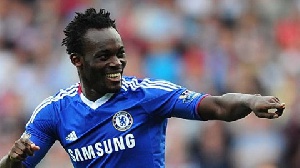When Chelsea lifted the Champions League in 2012 at the Allianz Arena, five of the vaunted ‘old guard’ were still important components of the side.
English pair of John Terry and Frank Lampard stood tall alongside fellow protagonists Didier Drogba, John Obi Mikel and Petr Cech...and there was Michael Essien, who was an unused substitute.
Of course, Terry didn’t feature against FC Hollywood either due to a moment of madness in the semi-final second-leg at Barcelona that ruled him out of the decider, but he was instrumental in their run to the Holy Grail that year.
It was slightly disappointing that Essien, who was there when the Blues’ quest began nearly a decade earlier, was nothing more than a bit-part player in West London when his colleagues finally reached the acme of the European game.
Still 29 at the time, the Ghanaian had suffered a spate of injuries that’d seen him lose the sheer explosiveness and dynamism of his time in France with Bastia and Olympique Lyonnais, which subsequently graced the English game in the second half of the decade.
The once high-octane midfield man had actually return from another severe cruciate ligament rupture mid-way through the 2011/12 campaign, missing a staggering 30 matches until his return in mid-January.
At that period, Andre Villas-Boas’ management was starting to unravel, and the Portuguese coach was eventually jettisoned in March with the Blues in danger of suffering an early exit in Europe after a damaging 3-1 defeat in Napoli.
Essien featured as a second-half substitute in Naples, alongside Lampard and Ashley Cole, signalling a humiliating climbdown by AVB who left his experienced heads except Drogba on the bench. Terry missed out completely.
All four were restored to the starting line-up for the reverse fixture, with the Ghana star featuring for the entire 120 minutes as the Blues called on the strength of the Bridge to progress after a 4-1 success.
However, that was to be the Bison’s last appearance on the continent. As Roberto Di Matteo utilised every ounce of experience available to him en route Champions League glory, the 2006 BBC African Footballer of the Year was nothing but a bystander.
In addition, he featured for a combined 30 minutes throughout their FA Cup journey too, which culminated in a 2-1 win over Liverpool in the decider. Unfortunately for Essien, he was an unused substitute, which had now become the norm.
Having played in the 2008 final defeat by Manchester United and painful aggregate loss at the hands of Barcelona the following season, he was now on the periphery of the team, and no longer on the same level with teammates with whom he’d started the journey.
Despite being the youngest of the influential old heads in the dressing room, the West African played little part in the club’s greatest night. Indeed, his legs were gone, and he was only a caricature of the box-to-box dynamo that thrilled between 2005 and 2009.
History will remember Drogba as the Chelsea legend, but it was Essien who, at one point, seemed on course to leave a more indelible mark at Stamford Bridge following a bright start under Jose Mourinho. While the Ivorian endured a frosty relationship with fans in his early years at the club, supporters took to his West African colleague almost immediately.
It’s no surprise they voted the midfielder their Player of the Year in 2007 even though Drogba scored 33 times in 06/07, then his most prolific return in blue.
The Ghana star’s dedication without possession, effervescence to get the team and fans going and ball-carrying to help the team’s transitions was valued in West London, and indeed away from England’s capital. The Bison, in his pomp, was one of the best midfielders in the world, which reflected in the Fifa World Player of the Year and Ballon d’Or nominations between 2005 and 2007.
Essien’s penchant for the spectacular was showcased in stunning strikes against Arsenal in 06/07 and Barcelona in 08/09. Both were voted the club’s best of those campaigns and are indeed two of the most remarkable strikes by Africans in history.
The former preserved the Blues’ unbeaten home record, while the latter nearly put them into successive CL finals against Manchester United. In a sense, it’s a shame that left-footed volley against Barca will forever be buried under the highly controversial officiating on the day.
Interestingly, the five-time African Footballer of the Year finalist only returned from a six-month absence weeks earlier and produced a top performance against a side that went on to become one of the best in history. Weeks earlier, he’d also scored against Juventus, nine days after his return from his first long-term injury.
There’s still a sense the two-time Ligue 1 champion could’ve achieved more had injuries not slowed him down in his late 20s, despite a dominant six-to-seven year spell in France and England.
Unfortunately, injury deprived him of a major role in Chelsea’s Champions League success and Ghana’s 2010 World Cup exploits two years earlier.
Having suffered an injury to his meniscus at Afcon 2010 in January, Essien missed the rest of the season and couldn’t recover in time for the global showpiece on African soil.
The Black Stars reached the quarter-finals without him, but another lengthy layoff in just over a year prevented the midfielder from being part of the best-performing African nation at the showpiece.
Another blow came in 2011, a year after he’d recovered from missing Africa’s World Cup, which proved to be the knockout punch.
Ghana’s greatest export of the 2000s missed 37, 24 and 30 games after three dreadful knee injuries between 2008 and 2011. The first metaphorical punch made him stagger a bit, the second likely made him wobble unsteadily but the third definitely took him out.
Not even Essien, with his superhuman physical nature, could’ve come out unscathed. The upshot of this was Africa not seeing the spirited Bison dominate in European football even longer than he did in his heyday.
Sports News of Sunday, 17 May 2020
Source: goal.com













